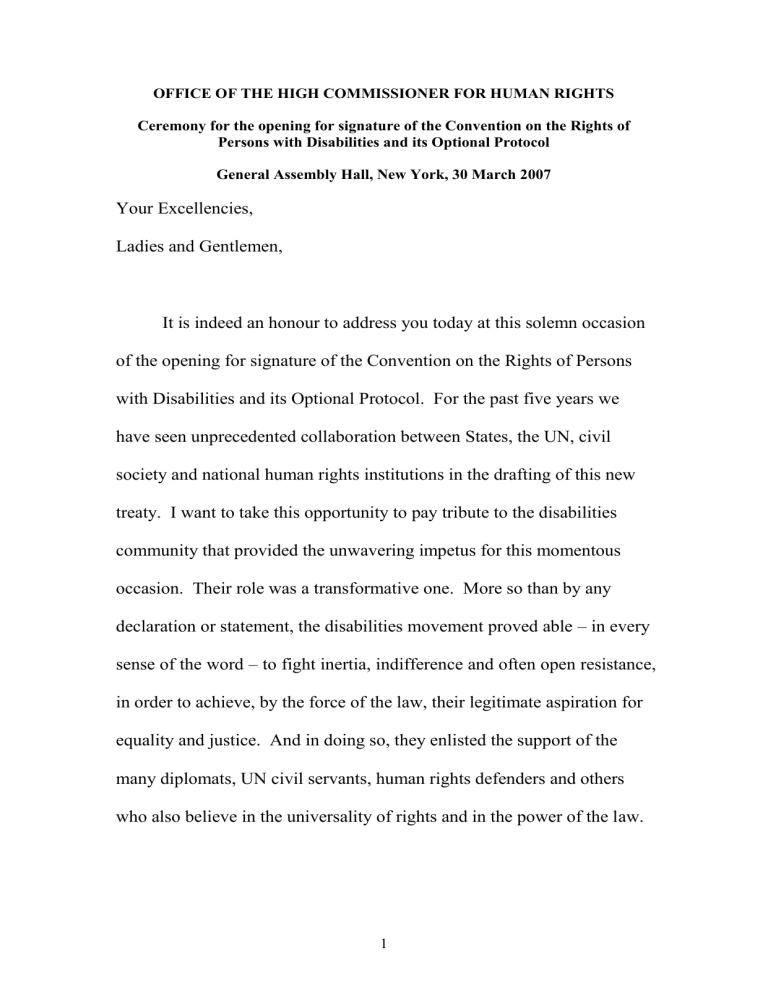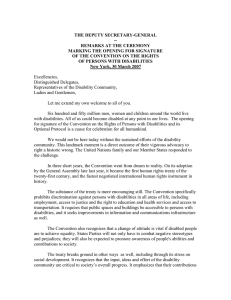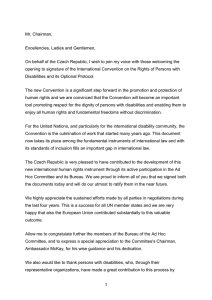High Commissioner for Human Rights - Morning statement for signing ceremony

OFFICE OF THE HIGH COMMISSIONER FOR HUMAN RIGHTS
Ceremony for the opening for signature of the Convention on the Rights of
Persons with Disabilities and its Optional Protocol
General Assembly Hall, New York, 30 March 2007
Your Excellencies,
Ladies and Gentlemen,
It is indeed an honour to address you today at this solemn occasion of the opening for signature of the Convention on the Rights of Persons with Disabilities and its Optional Protocol. For the past five years we have seen unprecedented collaboration between States, the UN, civil society and national human rights institutions in the drafting of this new treaty. I want to take this opportunity to pay tribute to the disabilities community that provided the unwavering impetus for this momentous occasion. Their role was a transformative one. More so than by any declaration or statement, the disabilities movement proved able – in every sense of the word – to fight inertia, indifference and often open resistance, in order to achieve, by the force of the law, their legitimate aspiration for equality and justice. And in doing so, they enlisted the support of the many diplomats, UN civil servants, human rights defenders and others who also believe in the universality of rights and in the power of the law.
1
Today’s event represents another milestone in the pursuit of true equality and in the combat against discrimination in all its forms. This particular convention illuminates both the blatant and the invidious ways in which beliefs, behaviours, practices and laws, serve to deprive persons with disabilities from their entitlement to achieve their fullest personal development and to contribute like everyone else to the common good.
Signing the Convention and the Optional Protocol is the first step in a process that represents an important commitment both nationally and internationally. Signature sends a strong signal to persons with and without disabilities that their governments are committed to protecting the rights of persons with disabilities. Improved enjoyment of human rights requires action, not only promises, achievements at national level and not only international agreements. The signing of this treaty should serve as a catalyst for that transformation. Signature of the Convention will help to raise awareness and mobilize political will towards achieving urgently needed change. These are essential preconditions for tackling the barriers of prejudice and stigma that continue to be our greatest collective disability.
2
Through this treaty States have also recognized, by consensus, that the need to combat discrimination against persons with disabilities is a legitimate concern of the international community.
The next vital step in this process is ratification of the treaty and the optional protocol. Through it, States make their pledge binding and give it legal force, empowering persons with disabilities and their representative organizations, as well as the international community, to hold them accountable for respecting those promises. In some cases those commitments can and must be met immediately; in others, time and effort will be needed over a longer period. In any event, one thing is clear – that those States signing this Convention here today are, by that act, pledging that things will not remain the same.
Ladies and Gentlemen,
Ultimately, the force of the law and policy reform will be tested through the strength of engagement in implementation and monitoring the concrete applications of the Convention. Now is the time to take stock and assess whether the situation of persons with disabilities in each of our countries meets the standards set by the Convention.
3
I welcome the commitment that signatories undertake today to advance the rights of persons with disabilities. I look forward to working with you to secure effective implementation of the Convention and of the
Optional Protocol so that persons with disabilities know that our shared engagement is firmly anchored in law and extends beyond it.
4



